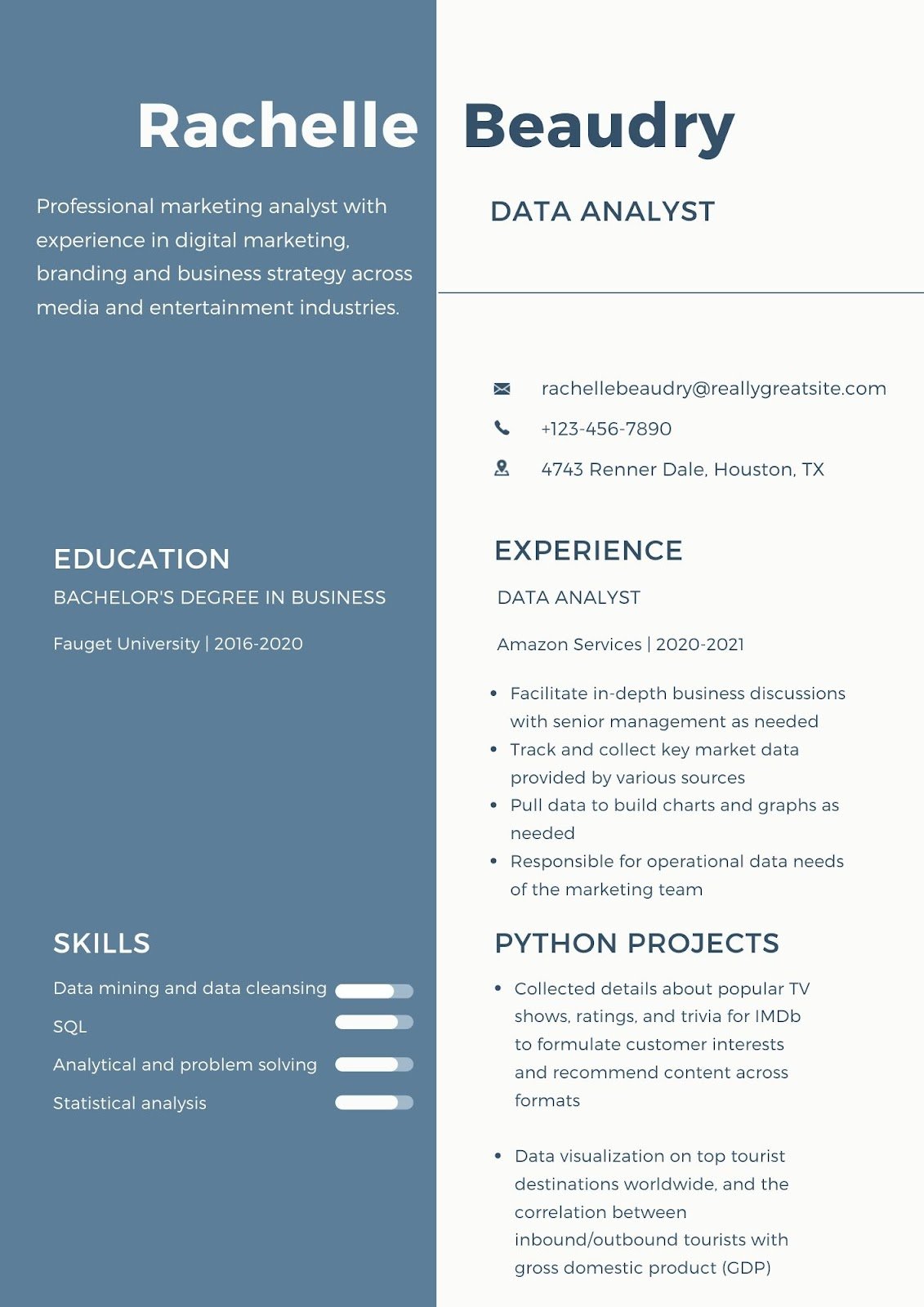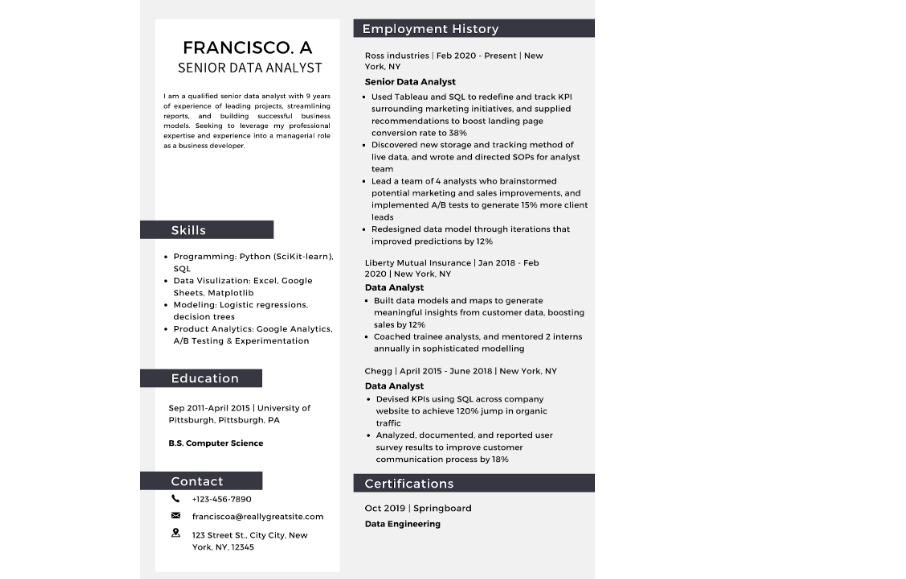11 Tips to Write Your Data Analyst Resume

.webp)
It does not matter if you're a fresher or a professional looking to switch to data science - your resume makes the first impression on your potential employer. A data analyst resume that stands out can open numerous doors of opportunities for you.
Whether you are a novice in data science, have a Data Science certification, or have years of experience under your belt, these eleven resume tips will help you grab the attention of hiring managers.
By the end of this blog, you'll learn to make a resume that will answer these questions:
- How do I write a resume for a data analyst?
- What should I put on my resume for data analysis?
- What is the best format for a data analyst CV?
So, keep reading!
{% module_block module "widget_f1d6152c-79d0-4a6f-b898-8d213c81513b" %}{% module_attribute "child_css" is_json="true" %}{% raw %}{}{% endraw %}{% end_module_attribute %}{% module_attribute "css" is_json="true" %}{% raw %}{}{% endraw %}{% end_module_attribute %}{% module_attribute "definition_id" is_json="true" %}{% raw %}null{% endraw %}{% end_module_attribute %}{% module_attribute "field_types" is_json="true" %}{% raw %}{"link":"text","text":"text"}{% endraw %}{% end_module_attribute %}{% module_attribute "label" is_json="true" %}{% raw %}null{% endraw %}{% end_module_attribute %}{% module_attribute "link" is_json="true" %}{% raw %}"https://www.odinschool.com/blog/data-science/data-analyst-job-description-responsibilities-skills-required-and-salary-trends"{% endraw %}{% end_module_attribute %}{% module_attribute "module_id" is_json="true" %}{% raw %}135590387735{% endraw %}{% end_module_attribute %}{% module_attribute "path" is_json="true" %}{% raw %}"/OdinSchool_V3/modules/Blog/blog - source links"{% endraw %}{% end_module_attribute %}{% module_attribute "schema_version" is_json="true" %}{% raw %}2{% endraw %}{% end_module_attribute %}{% module_attribute "smart_objects" is_json="true" %}{% raw %}null{% endraw %}{% end_module_attribute %}{% module_attribute "smart_type" is_json="true" %}{% raw %}"NOT_SMART"{% endraw %}{% end_module_attribute %}{% module_attribute "tag" is_json="true" %}{% raw %}"module"{% endraw %}{% end_module_attribute %}{% module_attribute "text" is_json="true" %}{% raw %}"Read More - Data Analyst: Roles, Responsibilities, and Salary Trends"{% endraw %}{% end_module_attribute %}{% module_attribute "type" is_json="true" %}{% raw %}"module"{% endraw %}{% end_module_attribute %}{% module_attribute "wrap_field_tag" is_json="true" %}{% raw %}"div"{% endraw %}{% end_module_attribute %}{% end_module_block %}Tips to Create a Data Analyst Resume
Tip 1 - Tailor Your Resume to the Job Description
Customizing your resume for each job application is a critical step.
Hiring managers will scan your resume to see if you match any of those keywords, and sometimes, in higher-demand positions (data analysis is in high demand), they will do this through a bot.
Action Point: Add keywords from the job description to your resume. Create a skill section and incorporate the most essential keywords there. For example, if the job requires expertise in a specific programming language, make sure to feature your proficiency in that language prominently.
Tip 2 - Highlight Technical Skills and Tools
As a data analyst, your proficiency in technical tools like Power BI and Tableau and programming languages like Python is paramount.
Action Point - Provide a detailed list of the tools you're proficient in, along with any certifications or courses you've completed related to these technologies. Additionally, consider showcasing your experience with database management systems (e.g., MySQL, PostgreSQL) and any specialized analytics platforms relevant to the role.
{% module_block module "widget_dc8423c8-8d0c-4822-96ec-3d9217075fda" %}{% module_attribute "child_css" is_json="true" %}{% raw %}{}{% endraw %}{% end_module_attribute %}{% module_attribute "css" is_json="true" %}{% raw %}{}{% endraw %}{% end_module_attribute %}{% module_attribute "definition_id" is_json="true" %}{% raw %}null{% endraw %}{% end_module_attribute %}{% module_attribute "field_types" is_json="true" %}{% raw %}{"link":"text","text":"text"}{% endraw %}{% end_module_attribute %}{% module_attribute "label" is_json="true" %}{% raw %}null{% endraw %}{% end_module_attribute %}{% module_attribute "link" is_json="true" %}{% raw %}"https://www.odinschool.com/blog/what-is-power-bi-features-architecture-types-of-visualization-and-components"{% endraw %}{% end_module_attribute %}{% module_attribute "module_id" is_json="true" %}{% raw %}135590387735{% endraw %}{% end_module_attribute %}{% module_attribute "path" is_json="true" %}{% raw %}"/OdinSchool_V3/modules/Blog/blog - source links"{% endraw %}{% end_module_attribute %}{% module_attribute "schema_version" is_json="true" %}{% raw %}2{% endraw %}{% end_module_attribute %}{% module_attribute "smart_objects" is_json="true" %}{% raw %}null{% endraw %}{% end_module_attribute %}{% module_attribute "smart_type" is_json="true" %}{% raw %}"NOT_SMART"{% endraw %}{% end_module_attribute %}{% module_attribute "tag" is_json="true" %}{% raw %}"module"{% endraw %}{% end_module_attribute %}{% module_attribute "text" is_json="true" %}{% raw %}"Read More - What is Power BI? Features, Types of Visualization, Architecture, Future and Jobs"{% endraw %}{% end_module_attribute %}{% module_attribute "type" is_json="true" %}{% raw %}"module"{% endraw %}{% end_module_attribute %}{% module_attribute "wrap_field_tag" is_json="true" %}{% raw %}"div"{% endraw %}{% end_module_attribute %}{% end_module_block %}Tip 3 - Show Quantifiable Achievements
Employers value candidates who can demonstrate their impact through quantifiable achievements. Quantifying your accomplishments not only provides concrete evidence of your capabilities but also showcases your ability to drive measurable results.
Action Point - Mention how you streamlined data processing workflows. Example - Highlight a project where your data analysis led to a specific improvement, such as a 20% reduction in customer churn.
{% module_block module "widget_ee5c4705-0cf7-4d63-b7b7-846390c84fd2" %}{% module_attribute "child_css" is_json="true" %}{% raw %}{}{% endraw %}{% end_module_attribute %}{% module_attribute "css" is_json="true" %}{% raw %}{}{% endraw %}{% end_module_attribute %}{% module_attribute "definition_id" is_json="true" %}{% raw %}null{% endraw %}{% end_module_attribute %}{% module_attribute "field_types" is_json="true" %}{% raw %}{"link":"text","text":"text"}{% endraw %}{% end_module_attribute %}{% module_attribute "label" is_json="true" %}{% raw %}null{% endraw %}{% end_module_attribute %}{% module_attribute "link" is_json="true" %}{% raw %}"https://www.odinschool.com/blog/curiosity-sparks-manishs-journey-from-electronics-to-data-science"{% endraw %}{% end_module_attribute %}{% module_attribute "module_id" is_json="true" %}{% raw %}135590387735{% endraw %}{% end_module_attribute %}{% module_attribute "path" is_json="true" %}{% raw %}"/OdinSchool_V3/modules/Blog/blog - source links"{% endraw %}{% end_module_attribute %}{% module_attribute "schema_version" is_json="true" %}{% raw %}2{% endraw %}{% end_module_attribute %}{% module_attribute "smart_objects" is_json="true" %}{% raw %}null{% endraw %}{% end_module_attribute %}{% module_attribute "smart_type" is_json="true" %}{% raw %}"NOT_SMART"{% endraw %}{% end_module_attribute %}{% module_attribute "tag" is_json="true" %}{% raw %}"module"{% endraw %}{% end_module_attribute %}{% module_attribute "text" is_json="true" %}{% raw %}"Read More - How fascination for technology led Manish from engineering to a thriving data analyst career?"{% endraw %}{% end_module_attribute %}{% module_attribute "type" is_json="true" %}{% raw %}"module"{% endraw %}{% end_module_attribute %}{% module_attribute "wrap_field_tag" is_json="true" %}{% raw %}"div"{% endraw %}{% end_module_attribute %}{% end_module_block %}Tip 4 - Emphasize Data Cleaning and Preprocessing Skills
Data cleaning and preprocessing are foundational steps in the data analysis process. Employers appreciate candidates who can effectively handle messy or incomplete data.
Action Point - Mention specific techniques and tools you've used to clean and prepare data for analysis. This might include skills in data wrangling libraries like pandas in Python or proficiency in Excel for data cleansing tasks.
Tip 5 - Demonstrate Data Visualization Proficiency
Effective data visualization is crucial for conveying insights to stakeholders.
Action Point - Provide examples of visualizations you've created, explaining how they enhanced understanding or facilitated decision-making. Discuss the tools you used and the thought process behind your visualization choices. Whether designing interactive dashboards or crafting informative reports, showcasing your ability to present data compellingly and understandably is a valuable asset.
Tip 6 - Show Adaptability and Continuous Learning
The tech landscape is constantly evolving, and data analysts need to stay up-to-date with the latest tools and techniques.
Demonstrating your commitment to the ever-changing demands of the field to employers, especially on a data analyst fresher resume, is very important.
Action Point - Mention any relevant certifications, courses, or workshops you've completed. This could include online Data Science courses on platforms like OdinSchool or certifications from Microsoft or Google.
Tip - Consider beginning with a short course that aligns with your interests and goals. Completing a course like OdinSchool's data science course allows you to include the certification on your resume, boosting your credibility and opening doors to further opportunities in the data science field.
Tip 7 - Highlight Soft Skills and Teamwork
While technical skills are crucial, soft skills are equally important in a data analyst role. These qualities are invaluable for ensuring that the insights you generate are accurate but also actionable and understandable for the entire team.
Action Point - Emphasize your ability to work collaboratively with cross-functional teams, communicate effectively with non-technical stakeholders, and showcase attention to detail in your work.
{% module_block module "widget_e8d9101d-1088-4bb4-94b6-50e4eec7c930" %}{% module_attribute "child_css" is_json="true" %}{% raw %}{}{% endraw %}{% end_module_attribute %}{% module_attribute "css" is_json="true" %}{% raw %}{}{% endraw %}{% end_module_attribute %}{% module_attribute "definition_id" is_json="true" %}{% raw %}null{% endraw %}{% end_module_attribute %}{% module_attribute "field_types" is_json="true" %}{% raw %}{"link":"text","text":"text"}{% endraw %}{% end_module_attribute %}{% module_attribute "label" is_json="true" %}{% raw %}null{% endraw %}{% end_module_attribute %}{% module_attribute "link" is_json="true" %}{% raw %}"https://www.odinschool.com/blog/aeronautical-engineer-to-a-bi-analyst-blend360-with-10-lpa"{% endraw %}{% end_module_attribute %}{% module_attribute "module_id" is_json="true" %}{% raw %}135590387735{% endraw %}{% end_module_attribute %}{% module_attribute "path" is_json="true" %}{% raw %}"/OdinSchool_V3/modules/Blog/blog - source links"{% endraw %}{% end_module_attribute %}{% module_attribute "schema_version" is_json="true" %}{% raw %}2{% endraw %}{% end_module_attribute %}{% module_attribute "smart_objects" is_json="true" %}{% raw %}null{% endraw %}{% end_module_attribute %}{% module_attribute "smart_type" is_json="true" %}{% raw %}"NOT_SMART"{% endraw %}{% end_module_attribute %}{% module_attribute "tag" is_json="true" %}{% raw %}"module"{% endraw %}{% end_module_attribute %}{% module_attribute "text" is_json="true" %}{% raw %}"Read More - How did Lokesh recognise his field's limitations and pursue data science to expand his career opportunities?"{% endraw %}{% end_module_attribute %}{% module_attribute "type" is_json="true" %}{% raw %}"module"{% endraw %}{% end_module_attribute %}{% module_attribute "wrap_field_tag" is_json="true" %}{% raw %}"div"{% endraw %}{% end_module_attribute %}{% end_module_block %}Additional Tips to Better Your Data Analyst Resume
These tips apply to any resume, whether it is a data analyst resume for freshers, a data scientist resume, a data engineer resume, etc.
Tip 8 - Use Active Language
Active language can make any experience description more impactful.
Action Point - Try to use active language like “achieved,” “earned,” and “accomplished".
Tip 9 - Craft a clear summary statement
The data analyst profile summary should be brief on your skills, experience and passion for the role. You could even summarize using AI to help craft a concise yet impactful statement that highlights your qualifications.
Action Point - Tailor to the job you are applying for that includes mentioning specific skills or achievements relevant to the role. At the same time, mention your passion for the role.
Tip 10 - LinkedIn Profile
75% of talent scouts use LinkedIn Recruiter to find resumes. They use search options based on keywords like job title and skills. Include your LinkedIn profile on the resume header, especially if you have recommendations on LinkedIn or write posts related to your work there.
Action Point - Optimize your LinkedIn profile with these steps
{% module_block module "widget_b26c1128-fe93-4ce9-b062-2f94e665e683" %}{% module_attribute "child_css" is_json="true" %}{% raw %}{}{% endraw %}{% end_module_attribute %}{% module_attribute "css" is_json="true" %}{% raw %}{}{% endraw %}{% end_module_attribute %}{% module_attribute "definition_id" is_json="true" %}{% raw %}null{% endraw %}{% end_module_attribute %}{% module_attribute "field_types" is_json="true" %}{% raw %}{"link":"text","text":"text"}{% endraw %}{% end_module_attribute %}{% module_attribute "label" is_json="true" %}{% raw %}null{% endraw %}{% end_module_attribute %}{% module_attribute "link" is_json="true" %}{% raw %}"https://www.linkedin.com/business/sales/blog/profile-best-practices/17-steps-to-a-better-linkedin-profile-in-2017"{% endraw %}{% end_module_attribute %}{% module_attribute "module_id" is_json="true" %}{% raw %}135590387735{% endraw %}{% end_module_attribute %}{% module_attribute "path" is_json="true" %}{% raw %}"/OdinSchool_V3/modules/Blog/blog - source links"{% endraw %}{% end_module_attribute %}{% module_attribute "schema_version" is_json="true" %}{% raw %}2{% endraw %}{% end_module_attribute %}{% module_attribute "smart_objects" is_json="true" %}{% raw %}null{% endraw %}{% end_module_attribute %}{% module_attribute "smart_type" is_json="true" %}{% raw %}"NOT_SMART"{% endraw %}{% end_module_attribute %}{% module_attribute "tag" is_json="true" %}{% raw %}"module"{% endraw %}{% end_module_attribute %}{% module_attribute "text" is_json="true" %}{% raw %}"Read More - 20 steps to a better LinkedIn profile in 2023"{% endraw %}{% end_module_attribute %}{% module_attribute "type" is_json="true" %}{% raw %}"module"{% endraw %}{% end_module_attribute %}{% module_attribute "wrap_field_tag" is_json="true" %}{% raw %}"div"{% endraw %}{% end_module_attribute %}{% end_module_block %}Tip 11 - Use Easy Formatting
Using bullet points makes your resume easier to read and allows hiring managers to scan through your qualifications quickly.
Action Point - Use bullet points to highlight your accomplishments, skills, and experience.
Data Analyst Resume Sample
So far, we’ve covered the essential details to include in any data analyst resume. Now let us look at some examples.
Entry-level data analyst resume
Don't worry too much about your lack of full-time experience if you're just getting started. You will be applying for positions as an entry-level data analyst, after all. When drafting your CV, emphasise the technical expertise, projects, internships, certifications, schooling, and related skills that will demonstrate your interest in the position and preparedness for work.

Mid/Senior-level data analyst resume
As an experienced data analytics professional, you must highlight the diversity and depth of your experience along with your professional development path. What role changes did you experience when you moved jobs? Did you get promoted? Have you taken on more strategy, client services, or team leadership duties?When you write about your work experience, emphasise the influence and business necessity you generated. Here are some more suggestions for possible inclusions:
- Initiatives involving data analysis and corporate decision-making
- Key business needs were the driving force behind developing and implementing new analytics models.
- Occurrences where you contributed your subject-matter knowledge Complete data management experience

Conclusion
Crafting a standout resume is crucial to landing your dream job as a data analyst.
You'll set yourself apart from the competition by tailoring your resume to the job description, emphasizing technical skills, showcasing achievements, and highlighting soft skills.
Remember, your resume reflects your abilities, so ensure it effectively communicates your value as a data analyst.
Good luck with your job search!
-1.webp)